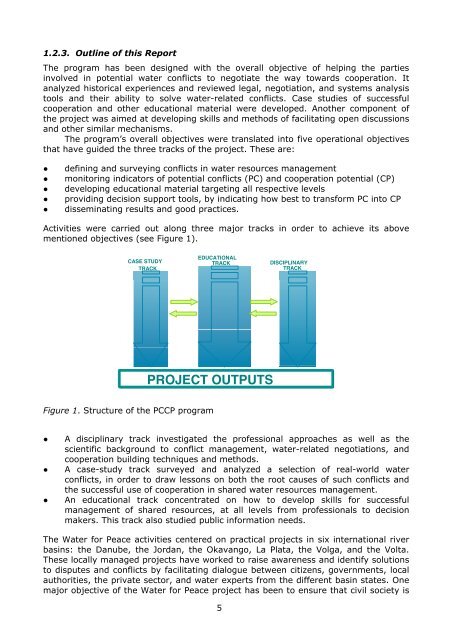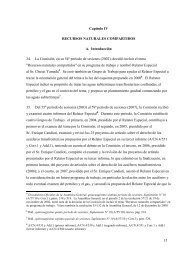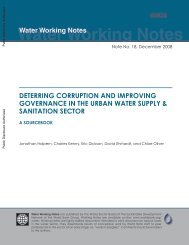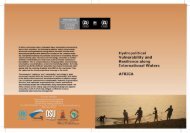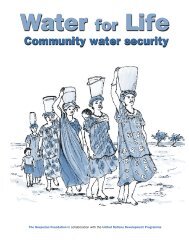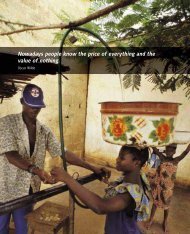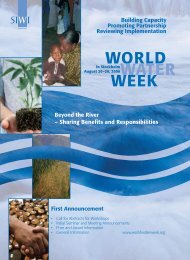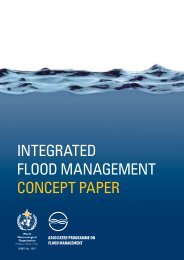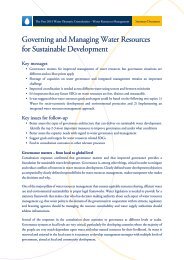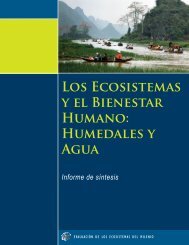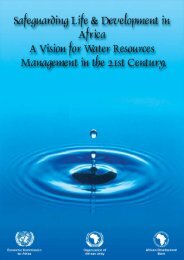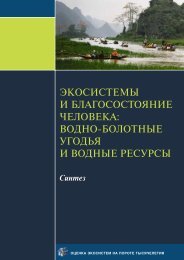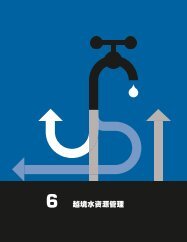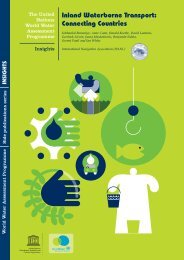Water security and peace: a synthesis of studies ... - unesdoc - Unesco
Water security and peace: a synthesis of studies ... - unesdoc - Unesco
Water security and peace: a synthesis of studies ... - unesdoc - Unesco
You also want an ePaper? Increase the reach of your titles
YUMPU automatically turns print PDFs into web optimized ePapers that Google loves.
1.2.3. Outline <strong>of</strong> this Report<br />
The program has been designed with the overall objective <strong>of</strong> helping the parties<br />
involved in potential water conflicts to negotiate the way towards cooperation. It<br />
analyzed historical experiences <strong>and</strong> reviewed legal, negotiation, <strong>and</strong> systems analysis<br />
tools <strong>and</strong> their ability to solve water-related conflicts. Case <strong>studies</strong> <strong>of</strong> successful<br />
cooperation <strong>and</strong> other educational material were developed. Another component <strong>of</strong><br />
the project was aimed at developing skills <strong>and</strong> methods <strong>of</strong> facilitating open discussions<br />
<strong>and</strong> other similar mechanisms.<br />
The program’s overall objectives were translated into five operational objectives<br />
that have guided the three tracks <strong>of</strong> the project. These are:<br />
! defining <strong>and</strong> surveying conflicts in water resources management<br />
! monitoring indicators <strong>of</strong> potential conflicts (PC) <strong>and</strong> cooperation potential (CP)<br />
! developing educational material targeting all respective levels<br />
! providing decision support tools, by indicating how best to transform PC into CP<br />
! disseminating results <strong>and</strong> good practices.<br />
Activities were carried out along three major tracks in order to achieve its above<br />
mentioned objectives (see Figure 1).<br />
CASE STUDY<br />
TRACK<br />
EDUCATIONAL<br />
TRACK<br />
DISCIPLINARY<br />
TRACK<br />
PROJECT OUTPUTS<br />
Figure 1. Structure <strong>of</strong> the PCCP program<br />
! A disciplinary track investigated the pr<strong>of</strong>essional approaches as well as the<br />
scientific background to conflict management, water-related negotiations, <strong>and</strong><br />
cooperation building techniques <strong>and</strong> methods.<br />
! A case-study track surveyed <strong>and</strong> analyzed a selection <strong>of</strong> real-world water<br />
conflicts, in order to draw lessons on both the root causes <strong>of</strong> such conflicts <strong>and</strong><br />
the successful use <strong>of</strong> cooperation in shared water resources management.<br />
! An educational track concentrated on how to develop skills for successful<br />
management <strong>of</strong> shared resources, at all levels from pr<strong>of</strong>essionals to decision<br />
makers. This track also studied public information needs.<br />
The <strong>Water</strong> for Peace activities centered on practical projects in six international river<br />
basins: the Danube, the Jordan, the Okavango, La Plata, the Volga, <strong>and</strong> the Volta.<br />
These locally managed projects have worked to raise awareness <strong>and</strong> identify solutions<br />
to disputes <strong>and</strong> conflicts by facilitating dialogue between citizens, governments, local<br />
authorities, the private sector, <strong>and</strong> water experts from the different basin states. One<br />
major objective <strong>of</strong> the <strong>Water</strong> for Peace project has been to ensure that civil society is<br />
5


